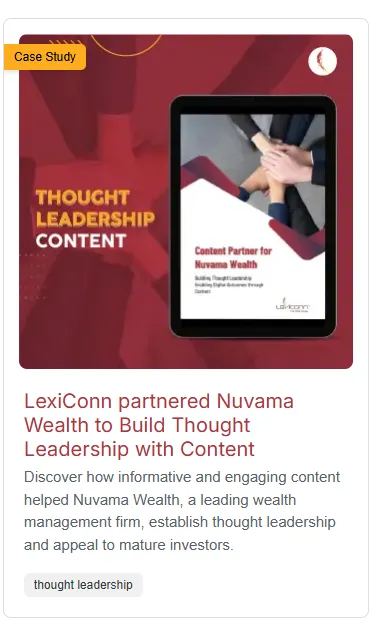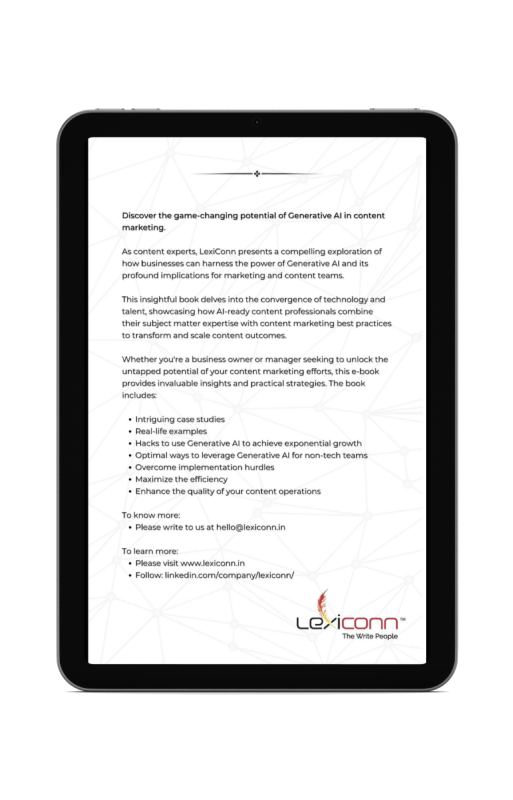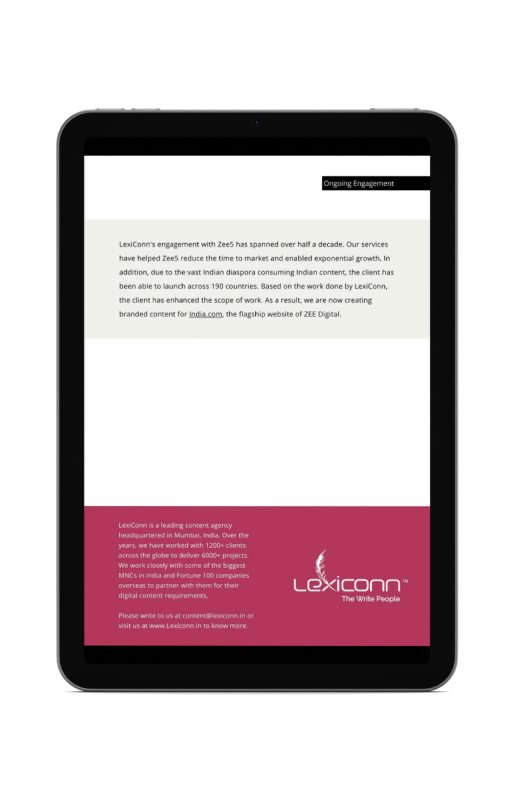

(Source)
In today’s cutthroat business environment, small and medium-sized enterprises (SMEs) are constantly seeking innovative strategies to differentiate themselves and drive sustainable growth. Among these strategies, thought leadership has emerged as an impactful tool that can transform how businesses position themselves in their respective markets.
Even a recent Thought Leadership Impact Study, 60% of decision-makers are more willing to pay a premium to work with an organization that has articulated a clear vision through thought leadership.
It's clear—well-crafted insights go a long way in shaping overall business success. This blog explores thought leadership for SMEs in greater depth.
|
See how Lexiconn helped Nuvama with thought leadership content |

(Source)
Thought leadership isn't just another buzzword in the marketing lexicon – it's a fundamental approach that can revolutionize how SMEs connect with their audience and expand their market presence.
At its core, thought leadership involves sharing unique insights, innovative ideas, and expert knowledge that addresses the most pressing challenges and opportunities within your industry.
For SMEs, particularly those operating in specialized or niche markets, thought leadership presents an unprecedented opportunity to level the playing field with larger competitors. By showcasing deep industry expertise and forward-thinking perspectives, even smaller organizations can position themselves as authoritative voices in their sector.

(Source)
One of the most significant advantages of thought leadership for SMEs is its ability to build credibility and trust with potential clients. When your organization consistently produces high-quality, insightful content that addresses real industry challenges, you naturally position yourself as a trusted advisor rather than just another service provider.
According to a recent Thought Leadership Impact Study, 60% of decision-makers are more willing to pay a premium to work with an organization that has articulated a clear vision through thought leadership. This demonstrates how effective thought leadership content directly influences purchasing decisions and business value perception.
In today's saturated markets, thought leadership for SMEs has emerged as a crucial differentiator that sets businesses apart from their competition. SMEs that consistently deliver valuable insights and innovative perspectives create a unique market position that competitors find difficult to replicate.
Through strategic content development and expert positioning, organizations can demonstrate their deep industry knowledge while addressing specific pain points that resonate with their target audience.
Successful thought leadership builds credibility by establishing a distinctive voice that reflects both expertise and authenticity. SME growth often hinges on the ability to communicate complex ideas in accessible ways, making technical concepts understandable and actionable for their audience.
This approach helps businesses move beyond traditional marketing to become trusted advisors in their respective industries.
Content strategy for industry leaders must focus on demonstrating a profound understanding of customer challenges. By addressing these pain points through well-researched content, SMEs can showcase their expertise while providing real value to their audience. This deep understanding creates stronger connections with potential clients and establishes the foundation for long-term relationships.

(Source)
Thought leadership serves as a powerful tool for attracting high-value prospects who are actively seeking industry expertise. When SMEs consistently share valuable insights and innovative solutions, they naturally attract qualified leads who are more likely to convert into long-term clients.
This targeted approach to lead generation often results in shorter sales cycles and higher conversion rates.
By demonstrating exceptional expertise through thought leadership content, SMEs can justify premium pricing strategies. This positioning allows businesses to move away from price-based competition and instead focus on value-based relationships. Organizations that successfully implement this strategy often find themselves in a stronger negotiating position with potential clients.
How thought leadership builds credibility extends beyond direct client relationships to create opportunities for strategic partnerships. By establishing themselves as industry authorities, SMEs can attract potential collaborators and partners who seek to align with recognized experts in their field. These partnerships often lead to expanded market opportunities and accelerated business growth.

(Source)
For small and medium enterprises looking to establish themselves as industry leaders, developing a comprehensive thought leadership strategy is crucial. This strategic approach helps build credibility and drives sustainable growth through expert positioning.
Thought leadership for SMEs begins with a clear understanding of what makes your organization unique. This foundation requires:
Deep Market Analysis
Conduct thorough research to understand where your expertise intersects with market needs. This involves analyzing competitor content, identifying underserved topics, and leveraging your organization's unique experiences and insights.
Audience-Centric Approach
Understanding your audience goes beyond basic demographics. Create detailed persona profiles that include:
Gap Analysis and Opportunity Identification
Examine current industry discourse to find unexplored angles or underserved perspectives. This helps in developing content that truly adds value and builds credibility in your sector.
Content strategy for industry leaders must focus on delivering exceptional value. Here's how to achieve this:
Research-Backed Insights
Case Study Development
Transform your successful projects into detailed case studies that:
Forward-Looking Content
Position your organization as a trendsetter by:
How thought leadership builds credibility largely depends on reaching the right audience through appropriate channels:
Digital Platforms
Industry Engagement
Track these specific metrics to measure how your thought leadership efforts contribute to SME growth:
Quantitative Metrics
Qualitative Indicators

(Source)
For SMEs embarking on their thought leadership journey, resource allocation presents a significant challenge. Creating realistic content creation schedules requires careful planning and consideration of available resources. Organizations must first assess their internal capabilities and establish achievable timelines that align with their thought leadership goals while maintaining daily operations.
Leveraging internal expertise effectively stands as a cornerstone of successful thought leadership. SME leaders should identify subject matter experts within their organization who can contribute valuable insights and industry knowledge. These internal champions can help shape content strategy while ensuring authenticity in thought leadership initiatives.
Partnering with content specialists has emerged as a strategic solution for SMEs looking to scale their thought leadership efforts. Professional content agencies understand how thought leadership builds credibility and can help develop comprehensive content strategies for industry leaders. This collaboration enables SMEs to maintain consistent, high-quality output without overwhelming internal resources.
Quality over quantity remains paramount in thought leadership content creation. Rather than pursuing aggressive publishing schedules, successful SME growth stems from well-researched, insightful content that genuinely adds value to the industry conversation.
Detailed content guidelines serve as the foundation for maintaining consistency in thought leadership initiatives. These guidelines should outline voice, tone, and messaging frameworks that align with the organization's broader business objectives and industry positioning.
Establishing robust review processes ensures that all thought leadership content meets quality standards and reinforces the organization's expertise. This includes implementing multiple review stages, fact-checking procedures, and alignment with industry best practices.
Content repository development plays a crucial role in sustainable thought leadership efforts. By creating a centralized database of approved content, research, and insights, SMEs can maintain consistency while efficiently repurposing and updating materials as needed.
Advanced content theme planning enables organizations to maintain a steady flow of relevant thought leadership material. This involves identifying key industry trends, anticipating market changes, and developing content calendars that address both current and emerging topics in the industry.
Through strategic resource management and consistent execution, SMEs can overcome common challenges in thought leadership development, ultimately driving sustainable growth and market expansion.

(Source)
As we look toward the evolving landscape of thought leadership for SMEs, several transformative trends and strategies are reshaping how businesses approach content strategy for industry leaders.
The future of thought leadership is being revolutionized by AI-powered content optimization, enabling SMEs to deliver more targeted and impactful messaging. This technology helps businesses analyze audience behavior, optimize content performance, and create more personalized experiences that resonate with their target market.
Video-based thought leadership has emerged as a dominant force in content strategy. SMEs are leveraging video content to showcase their expertise, share industry insights, and build credibility through visual storytelling. This format proves particularly effective in demonstrating complex concepts and establishing personal connections with audiences.
Interactive content experiences represent the next frontier in thought leadership. Through interactive webinars, augmented reality presentations, and immersive digital experiences, SMEs can engage their audience in meaningful two-way conversations that drive deeper understanding and retention of key messages.
Personalized content delivery has become crucial for SME growth.
To maintain effective thought leadership in this evolving landscape, SMEs must stay consistently updated with industry developments. This involves continuous market research, monitoring competitor activities, and identifying emerging trends that could impact their thought leadership position.
Investing in new content technologies has become non-negotiable for businesses aiming to establish themselves as industry leaders. This includes adopting advanced analytics tools, content management systems, and distribution platforms that enhance the reach and impact of thought leadership initiatives.
Audience engagement remains at the heart of successful thought leadership strategies. SMEs must focus on creating compelling narratives that spark discussions, encourage sharing, and foster community building around their brand's expertise and insights.
Maintaining authenticity in messaging serves as the foundation for credible thought leadership. As content strategies evolve, businesses must ensure their communications remain genuine, value-driven, and aligned with their core expertise and brand values.

(Source)
Developing internal thought leaders has become a cornerstone strategy for SMEs looking to strengthen their market position. Through strategic employee advocacy programs, organizations can amplify their thought leadership efforts while building credibility across multiple channels. When employees become active participants in sharing industry expertise, they create authentic touchpoints that resonate with target audiences.
For SMEs focused on building thought leadership, encouraging team members to participate in industry events creates valuable opportunities for knowledge exchange. Speaking engagements, panel discussions, and conference presentations allow internal experts to showcase their deep understanding while establishing the organization as an industry leader. This visibility helps SMEs build credibility through direct engagement with key stakeholders.
Internal thought leaders can significantly contribute to content strategy for industry leadership through professional blog contributions and thought pieces. By sharing their specialized knowledge and unique perspectives, employees help create a rich repository of expert content that demonstrates the organization's collective expertise. This approach strengthens the SME's position as a trusted source of industry insights.
Empowering employees to engage professionally on social media platforms extends the reach of SME thought leadership initiatives. Through carefully curated content sharing and meaningful interactions, team members can help establish the organization's authority while building valuable industry connections. This distributed approach to thought leadership creates multiple channels for market influence.
Webinar presentations provide an effective platform for internal thought leaders to showcase expertise while directly engaging with target audiences. These interactive sessions allow SMEs to demonstrate their industry knowledge, address specific challenges, and build credibility through real-time engagement with stakeholders.
To maintain consistency in thought leadership content, SMEs must establish robust knowledge management systems. These frameworks ensure that internal expertise is effectively captured, organized, and shared while maintaining the organization's distinctive voice. Such systems support sustainable thought leadership development by creating standardized processes for content creation and distribution.
The journey to becoming a thought leader requires dedication, consistency, and a clear vision. However, the rewards – from enhanced brand recognition to improved customer trust and business growth – make it a worthwhile investment for forward-thinking SMEs.
And we are here to help you with jus that!
Ready to transform your business through strategic thought leadership?
Visit us at www.lexiconn.in or drop us a line at [email protected]. LexiConn also offers a FREE 30-minute content consultation session to help you with your content strategy.
Let's work together to establish your brand as an industry authority and drive your business growth through compelling thought leadership content.




I have read and accept the Privacy Policy
Read More